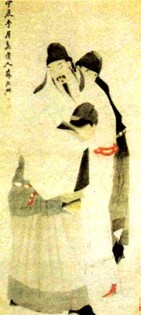人教高中英语高二上UNIT4-2
时间:2018-12-04 作者:英语课 分类:人教高中英语高二


Reading poetry brings people from different places and different times together. More than any other form of literature, poetry plays with sounds, words and grammar. That makes poetry difficult to write, but very interesting to read. Poetry also calls up all the colours, feelings, experiences and curious images of a dream world.
China has a long history during which many of the world's greatest poets were active. Poems by Du Fu, Li Bai and Wang Wei among others stand out in the halls of glory 1. When you have read some Chinese poems, you will have seen and heard some of the features that all good poetry shares. The form is very important: the number of lines and the number of characters in each line. Poetry often follows special patterns of rhythm 2 and rhyme 3.
Despite its short history, there is a lot of good English poetry around. The earliest English poetry was written in a kind of English that is now difficult to understand. Modern English started around the time of William Shakespeare 4, towards the end of the sixteenth century. The seventeenth century was a great time for English poetry. Shakespeare is most famous for his plays. His sonnets 5, however, belong to the best English poetry. In the next generation of great English poets we meet John Donne. Chinese readers admire his works 6 because of his use of surprising images that reminds them of the works of poets such as Su Dongpo. Before the end of the century, there was another famous writer, John Milton. Once published, his work became famous for the absence of rhyme at the end of each line. In the eighteenth century it was Alexander Pope 7 who wrote the finest poetry in England.
The next period that produced a great number of fine poets was the nineteenth century. Greatly
loved in China are the English Romantic 8 poets. Although they were all born in the eighteenth century, they wrote their major works in the early years of the nineteenth century. John Keats died at a very young age in 1821; while William Wordsworth, who spent much of his time in the English Lake District, lived to the age of 80 and died in 1850. The nature poems by William Wordsworth, George Gordon Byron's Isles 9 of Greece and the sonnets and long poems by John Keats have long been favourites. The style and atmosphere in their poems have often led to comparisons 10 with poets such as Du Fu and Li Bai.
Finally, modern poets have their special attraction 11 because they stand closest to us both in the language and images they use. Among them we find the American poet Robert Frost 12.
The introduction 13 of English poetry to China came late. Towards the end of the nineteenth century Chinese writers started reading more foreign poetry. The great moment for European literature to come to China is between 1910 and the late 1930s when famous writers such as Lu Xun and Guo Moruo translated both poetry and novels into Chinese.
More and more people are interested to read modern poetry in English. Translations can be good, but being able to read in English gives you much more choice. Besides, no matter how well a poem is translated, something of the spirit of the original work is lost. Reading poetry in English also opens the door to finding 14 new ways of expressing yourself in Chinese. Finally, poems and literature can be bridges between the East and the West. They can help us to understand each other better, or as Mu
Dan wrote:
- I was fascinated by the glory of the sunset.落日的壮观把我吸引住了。
- Let not the wise man glory in his wisdom.智者不可夸耀自己智慧。
- He has an ear for the rhythm of Irish speech.他对爱尔兰语的节奏很敏感。
- His poem has a pleasing rhythm.他的诗有和谐的韵律。
- I cannot find a rhyme to " hiccups ".我不能找到和 “hiccups”同韵的词。
- The last two lines of this poem don't rhyme properly.这首诗后两句不怎么压韵。
- Shakespeare is a giant among writers.莎士比亚是作家中的巨擘.
- He read Shakespeare to help his English.他阅读莎士比亚的作品以提高自己的英语水平。
- Keats' reputation as a great poet rests largely upon the odes and the later sonnets. 作为一个伟大的诗人,济慈的声誉大部分建立在他写的长诗和后期的十四行诗上。 来自《简明英汉词典》
- He referred to the manuscript circulation of the sonnets. 他谈到了十四行诗手稿的流行情况。 来自辞典例句
- We expect writers to produce more and better works.我们期望作家们写出更多更好的作品。
- The novel is regarded as one of the classic works.这篇小说被公认为是最优秀的作品之一。
- The Pope is the spiritual leader of many Christians.教皇是众多基督徒的宗教领袖。
- The Pope is the supreme leader of the Roman Catholic Church.教皇是罗马天主教的最高领袖。
- She thinks it will be romantic to be an actress.她认为当个女演员会很浪漫。
- Her husband is very romantic.她丈夫非常浪漫。
- the geology of the British Isles 不列颠群岛的地质
- The boat left for the isles. 小船驶向那些小岛。
- I. Comparisons to a Living Creature (i. e., the Sphinx riddle) 1.比作某种生物(如斯芬克司谜) 来自英汉非文学 - 民俗
- Make comparisons about the products. 对产品做对比。 来自超越目标英语 第4册
- The main attraction of the place is the nightlife.这个地方最具吸引力的是夜生活。
- Amy is always the centre of attraction at parties.艾米总是聚会上的中心人物。
- A lot of crops were damaged by the frost.这次霜冻,受害的庄稼不少。
- Try to harvest the fruit before the first frost.在第一次霜冻以前要设法把水果收摘完。
- The introduction tells you how to use the book.引言告诉你怎样使用这本书。
- A letter of introduction will ensure you an interview.凭一封介绍信准保会接待你。